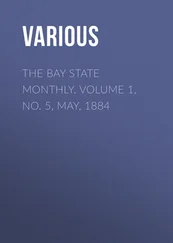Various - The Bay State Monthly, Volume 3, No. 5
Здесь есть возможность читать онлайн «Various - The Bay State Monthly, Volume 3, No. 5» — ознакомительный отрывок электронной книги совершенно бесплатно, а после прочтения отрывка купить полную версию. В некоторых случаях можно слушать аудио, скачать через торрент в формате fb2 и присутствует краткое содержание. Жанр: foreign_antique, periodic, foreign_edu, на английском языке. Описание произведения, (предисловие) а так же отзывы посетителей доступны на портале библиотеки ЛибКат.
- Название:The Bay State Monthly, Volume 3, No. 5
- Автор:
- Жанр:
- Год:неизвестен
- ISBN:нет данных
- Рейтинг книги:5 / 5. Голосов: 1
-
Избранное:Добавить в избранное
- Отзывы:
-
Ваша оценка:
- 100
- 1
- 2
- 3
- 4
- 5
The Bay State Monthly, Volume 3, No. 5: краткое содержание, описание и аннотация
Предлагаем к чтению аннотацию, описание, краткое содержание или предисловие (зависит от того, что написал сам автор книги «The Bay State Monthly, Volume 3, No. 5»). Если вы не нашли необходимую информацию о книге — напишите в комментариях, мы постараемся отыскать её.
The Bay State Monthly, Volume 3, No. 5 — читать онлайн ознакомительный отрывок
Ниже представлен текст книги, разбитый по страницам. Система сохранения места последней прочитанной страницы, позволяет с удобством читать онлайн бесплатно книгу «The Bay State Monthly, Volume 3, No. 5», без необходимости каждый раз заново искать на чём Вы остановились. Поставьте закладку, и сможете в любой момент перейти на страницу, на которой закончили чтение.
Интервал:
Закладка:
Various
The Bay State Monthly, Volume 3, No. 5
HON. WILLIAM W. CRAPO
A citizen of Massachusetts, eminent in public and private life, and now in the prime of manhood, is the Hon. William W. Crapo, of New Bedford. He is the son of Henry Howland Crapo, a man of marked abilities and with a distinguished career, whose father was a farmer in humble circumstances in Dartmouth, the parent town of New Bedford, and able to give but meagre opportunities for education to his son. Henry had, however, a thirst for knowledge, and his determination in providing himself with the means of study affords a parallel to the early life of Lincoln. It is told of him, that having no dictionary in his father's house, he undertook to be his own lexicographer in the task of preparing one. He soon fitted himself as a school teacher and afterwards became a land surveyor in New Bedford. As a man of ability and integrity, he at once began to rise to positions of trust, and among the offices he held were those of City Treasurer and Trustee of the Public Library. He was interested in the whale fisheries, then the great enterprise of this famous seaport, and was a successful business man.
In 1857, having made extensive timber purchases in Michigan, he removed to that state, where he took an active part in political affairs. In 1865, he was elected Governor of that State and held the office for four years. He was a lover of books all his life, and was the author of articles on horticulture in which subject he was an enthusiastic amateur.
William Wallace Crapo was born in Dartmouth, May 16, 1830, and was the only son in a family of ten children. He inherited his father's passion for learning and knowledge, and although his father's means were limited, he was given all possible opportunity for study. He was first in the New Bedford public schools, then at Phillips Academy in Andover, where he prepared for college. He graduated at Yale—which has since conferred upon him the Degree of Doctor of Laws,—in the class of 1852. Deciding on the study of law, he attended the Dane law school at Cambridge, and subsequently entered the office of Governor Clifford in New Bedford. In February 1855, he was admitted to the Bristol bar, and in the following April was elected City Solicitor, an office which he continued to hold for twelve consecutive years.
Mr. Crapo's first active part in politics was about a year after his admission to the bar. Fremont and Dayton were in 1856 nominated as the Republican candidates for the Presidency and Vice Presidency. Mr. Crapo was an earnest surporter of the candidates and made very effective speeches in their behalf in his section of the state. In the same year he was chosen to the Massachusetts House of Representatives, and the following year, when only twenty-seven years of age, was tendered a seat in the Massachusetts Senate, but declined the honor. His father this year removed to Michigan, and the son who remained became a worthy successor to the confidence and respect of his fellow-citizens. He was actively interested in the establishment of the New Bedford Water-works, and from 1865 to 1875 held the office of Chairman of the board of Water Commissioners. As Bank President, as director in extensive manufacturing corporations, and in other similar positions of trust and responsibility he acquired the reputation of being a sound business man, and an able financial manager. In all of these positions he has ever enjoyed the complete confidence and respect of his associates.
Mr. Crapo has been a diligent student of the history of the Old Colony and especially of the early settlement of Dartmouth, and he has rendered valuable contributions to the historical literature of the State. The address delivered by him at the Bi-Centennial Anniversary of the town of Dartmouth in 1864 and his address at the Centennial Celebration in New Bedford in 1876 exhibit his accurate research and his facility of clear and forcible expression. The closing sentences of the latter address were as follows:–
"We must preserve the results of the past. But this is not our whole duty. The work of our fathers is not completed. Our honor and safety is in still further achievements of public justice and orderly freedom, and to the advancement of the common welfare. Our mission is a continuous and steady development of conscientiousness, a moral and religious growth, keeping pace with advancing intelligence, science and liberty. We attain to it by those common virtues which our fathers exercised: honesty, frugality, integrity and unfaltering devotion to duty. We need but follow the old plain paths, and, undazzled by the superficial glitter and pretentious show of ambitious self-seekers, march steadily forward to the attainments of a trained and vigorous virtue, to purity, strength and solidity. Thus will we keep unsoiled our inheritance, and transmit it, beautified and glorified, to those who come after us.
"We have seen the forest fall before the strong arm of the pioneer; we have seen the shores lined with masts, and the waters white with sails; we have seen the triumphs of restless, cunning labor; but not in physical power nor in populous cities, not in factories nor palaces, nor richly laden fleets, are the elements of natural greatness, nor its safety, but in the courage, integrity, self-denial and temperance of the people, and the spirit of mental enterprise and moral freedom which inspires them."
But the reputation of Mr. Crapo in Massachusetts and the country at large rests preeminently upon his services in the National House of Representatives. He was elected to fill a vacancy in the Forty-fourth Congress and was returned at three successive elections, enjoying to an unusual degree the favor and approbation of his constituents. In the Forty-fifth Congress he was a member of the committee on Foreign Affairs. In the Forty-sixth he served on the committee on Banking and Currency, and was chairman of this important committee in the next Congress. He introduced the bill to extend the charters of the National Banks, and by his skillful and persistent efforts the bill became a law to the satisfaction of all sound business men. In his connection with this bill, Mr. Crapo added to his reputation as an able lawyer, that of a sound financier and a judicious statesman.
Representing a constituency whose interests are largely identified with the fishing industries, Mr. Crapo has naturally been considered a champion of the fishermen. A strong speech was made by him on the resolution recommending the abrogation of the fishing articles of the Treaty of Washington, of which the following is an example:—
"For seventy years this Government, and prior to that the Colonies, paid liberal bounties to aid the development and increase of our fishing marine. These bounties have been abandoned, and the New England fishermen, relying upon their energy and enterprise do not ask a renewal of them. But they do ask that the United States shall not offer a bounty to build up this industry in the hands of rivals. When we are confronted with a declining merchant marine, when the carrying trade is passing into the hands of foreigners, when we remember that our whaling fleet, which twenty years ago numbered 600 ships with 18,000 sailors, the best sailors on the globe, disciplined and educated in voyages of three and four year's duration—is now reduced to 163 vessels with less than 5,000 men, we may well inquire, where are we to look for experienced seamen to man our navy in case of foreign war? We can build vessels of war in a few weeks when the emergency arises. With our resources of timber, and iron and copper, and every material entering into the construction of our vessels, we can build ships at short notice in our private shipyards, even if we cannot in our navy yards, but efficient and hardy sailors come only from the training and experience of years of toil and danger upon the sea."
Читать дальшеИнтервал:
Закладка:
Похожие книги на «The Bay State Monthly, Volume 3, No. 5»
Представляем Вашему вниманию похожие книги на «The Bay State Monthly, Volume 3, No. 5» списком для выбора. Мы отобрали схожую по названию и смыслу литературу в надежде предоставить читателям больше вариантов отыскать новые, интересные, ещё непрочитанные произведения.
Обсуждение, отзывы о книге «The Bay State Monthly, Volume 3, No. 5» и просто собственные мнения читателей. Оставьте ваши комментарии, напишите, что Вы думаете о произведении, его смысле или главных героях. Укажите что конкретно понравилось, а что нет, и почему Вы так считаете.












